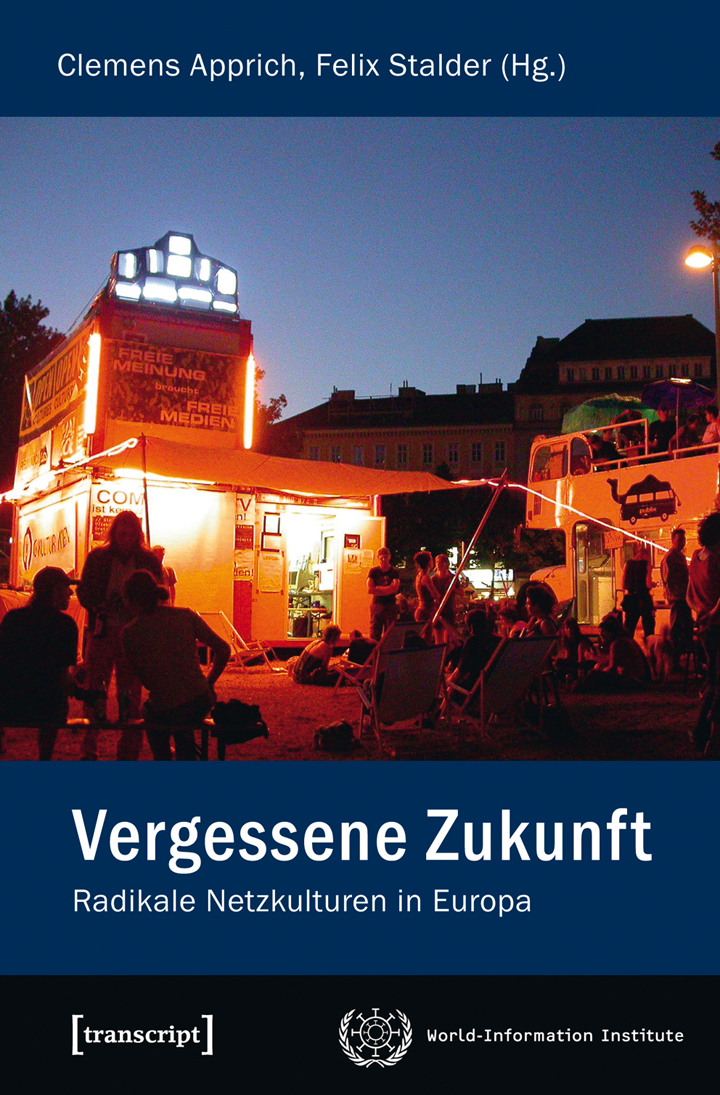Clemens Apprich, Felix Stalder (eds.): Vergessene Zukunft: radikale Netzkulturen in Europa (2012) [German]
Filed under book | Tags: · internet, internet culture, media culture, net criticism, network culture, networks, web

“Mitte der 1990er Jahre ist in Europa eine vielfältige Netzkultur entstanden. Während die US-amerikanische Szene den Cyberspace als Raum jenseits der Politik imaginierte, waren die europäischen Netzpioniere darauf bedacht, die Möglichkeiten des Internet für neue politische und kulturelle Initiativen in der realen Gesellschaft zu nutzen.
Anhand von Zeitdokumenten, aktuellen Textbeiträgen und Interviews geht dieser Band erstmals auf die kritische Haltung europäischer Netzkulturen ein. Die Beiträge liefern so wichtige Referenzpunkte zur Gestaltung unserer techno-kulturellen Gegenwart jenseits von Facebook und Google.”
Publisher transcript, Bielefeld, 2012
Kultur- und Medientheorie series
ISBN 9783837619065, 3837619060
348 pages
via ResearchGate
Interview with editor: Vera Tollmann (Springerin, 2013).
Reviews: Verena Pizzini (kulturrisse, 2012), Leonhard Dobusch (Netzpolitik, 2012), Werner Reiter (The Gap, 2012), Martin Schmitt (sehepunkte, 2013).
Comment (0)Marcello Vitali-Rosati: On Editorialization: Structuring Space and Authority in the Digital Age (2018)
Filed under book | Tags: · algorithm, authority, digital media, editing, editorialization, media, open access, public space, space, web, writing

“In this book Marcello Vitali-Rosati examines how authority changes in the digital era. Authority seems to have vanished in the age of the web, since the spatial relationships that authority depends on are thought to have levelled out: there are no limits or boundaries, no hierarchies or organized structures anymore. Vitali-Rosati claims the opposite to be the case: digital space is well-structured and material and has specific forms of authority. Editorialization is one key process that organizes this space and thus brings into being digital authority. Investigating this process of editorialization, Vitali-Rosati reveals how politics can be reconceived in the digital age.”
Publisher Institute of Network Cultures, Amsterdam, 2018
Theory on Demand series, 26
Creative Commons BY-NC-ND 4.0 International License
ISBN 9492302209, 9789492302205
114 pages
Megan Driscoll: Art on the Internet and the Digital Public Sphere, 1994-2003 (2018)
Filed under book | Tags: · art history, internet, internet art, net art, networks, public sphere, web
“This dissertation narrates the development of internet art, a diverse set of practices united by their interrogation of the technological, social, and/or political bases of computer networks. Covering the period from 1994, when internet art coalesced around the rise of the World Wide Web, to 2003, when both internet art and internet culture writ large began to respond to the rise of social media and web 2.0 technologies, the dissertation homes in on specific net art projects that variously engaged or challenged this period’s most persistent claim: that the internet is a new, digital public sphere. By studying how these artworks critiqued this claim, the dissertation uncovers three major models through which net art has asserted the publicness of computer networks—as an interpersonal network that connects or unites strangers into groups; as a virtual space akin to physical spaces of public gathering, discourse, and visibility; and as a unique platform for public speech, a new mass media potentially accessible to all.
Claims for the public status of computer networks rest on their ability to circulate information and facilitate discussion and debate. This definition of publicness is rooted in the concept of the classical public sphere as theorized by J�rgen Habermas. The dissertation thus reviews Habermas’s model of the classical public sphere, and its most significant critiques, in order to interrogate the terms of a digital public sphere. The dissertation also engages Michael Warner’s work on the formation of publics, counterpublics, and the mass-cultural public sphere; Oskar Negt and Alexander Kluge’s analysis of shared experience as the foundation of the formation of public spheres and the role of mass media in this process; Henri Lefebvre’s articulation of the social production of space; and Gilles Deleuze and Alexander Galloway’s respective analyses of the role of network logics in systems of control.
As a whole, the dissertation provides an historical account and critical analysis of internet art that encompasses not only its technological evolution but also its confrontation with the claims of publicness upon which our understanding of computer networks, and the art made on and about them, are founded.”
PhD Dissertation
Publisher University of California, Los Angeles, 2018
349 pages
via Cornelia

